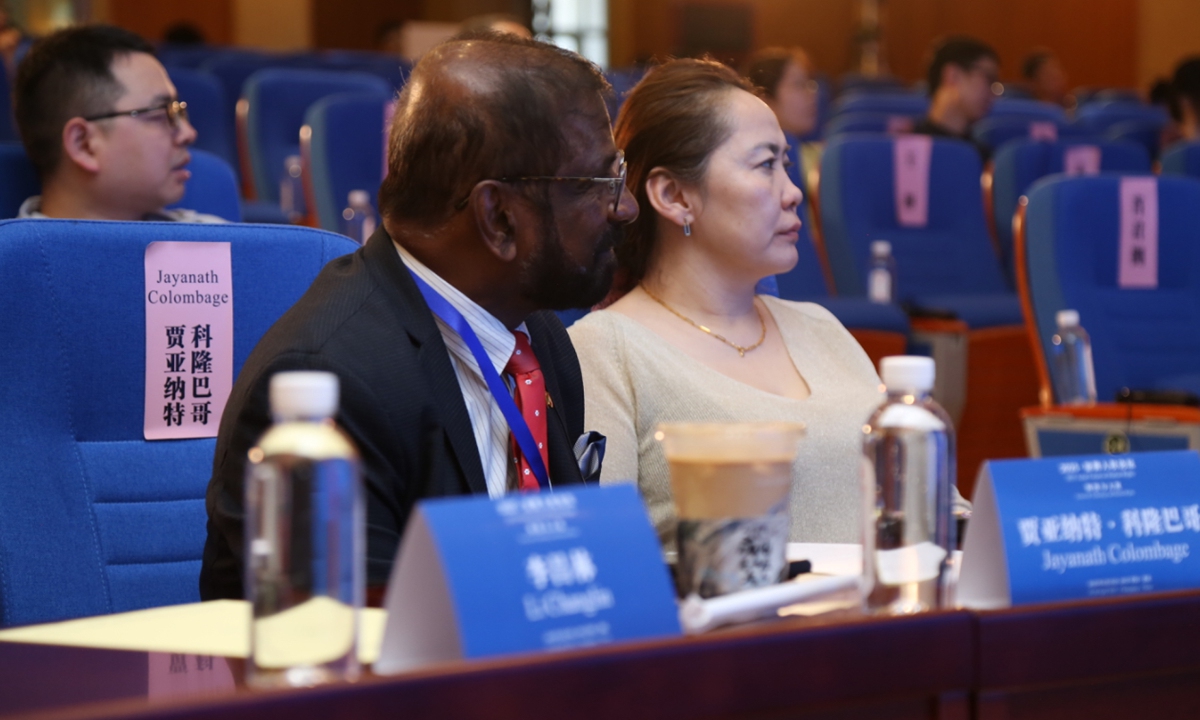
Attendees at 2025 Asian Forum on Human Rights held in Southwest China's Chongqing on April 20, 2025 Photo: Courtesy of the Human Rights Institute at Southwest University of Political Science and Law (SWUPL)
The dual-edged nature of digital technology has created new human rights issues, presenting both opportunities and challenges. At a forum in Southwest China's Chongqing, human rights experts discussed China's approach to balancing technological advancement with human rights protection.
The two-day 2025 Asian Forum on Human Rights, themed "Science, Technology, and Human Rights," concluded on Sunday in Chongqing. The forum brought together nearly 60 human rights scholars from China and abroad to explore how advancements in science and technology can be aligned with the promotion and protection of human rights in Asia.
On how AI may infringe on human rights, Xiao Junyong, executive director of the Center for Si&Tech and Human Rights Studies of Beijing Institute of Technology, told the Global Times at the forum that privacy is a key concern. He noted that some AI applications collect, and share, a large amount of personal data, such as location information and browsing history, without the user's consent.
AI may intensify social discrimination due to data bias and limitations in algorithmic technology, Xiao said. The final analysis results from AI can perpetuate or amplify existing social inequalities during the decision-making process. For example, biases in recruitment algorithms related to gender or race can infringe on the rights of certain groups, he said.
When it comes to assigning responsibility in some scenarios where individuals and machines are jointly involved in harmful incidents, there are gray areas, Chen Jingyuan, an assistant professor of Law School of Renmin University of China, said at the forum.
But for AI technology itself, Liu Xiaolan, a PhD candidate on jurisprudence from People's Public Security University of China, told the Global Times it is neutral. She added that its social impact depends on the interplay between technology design, application scenarios, governance frameworks and whether we can establish a technological governance ecosystem that aligns with social justice.
In 2021, China issued Ethical Norms for New Generation Artificial Intelligence, aiming to incorporate ethics into the entire AI life cycle. Later, in 2024, a framework concerning the security governance of AI was released, which features principles in managing the security of AI, outlining principles such as prudent risk management, proactive safety measures and opening up to cooperation for joint governance, the Xinhua News Agency reported.
Over the years, China has explored governance paths to better leverage technology as a tool to promote social justice and development, which Liu described as "ethics come first, allowing laws and regulations and policy implementation to empower AI, along with expanded international collaboration."
At the forum, human rights scholars and officials from China and abroad disccused how China is using AI to empower social development, such as guaranteeing rural health rights through smart healthcare, protecting vulnerable groups from algorithmic discrimination, and safeguarding the rights of the elderly.
When planning smart driving applications, for example, China also incorporates factors related to human rights protection, said Zheng Zhifeng, a professor from Institute of Science and Technology Law of Southwest University of Political Science and Law.
Zheng told the Global Times that the arrival of autonomous vehicles will pose challenges to the professions of ride-hailing drivers and taxi drivers. However, as early as 2017, China's State Council released a generation AI development plan emphasizing the need to study how AI will impact employment structures and to develop new skills for emerging job types.
The plan highlighted the need to strengthen employment training and ensure that workers in repetitive roles can smoothly transition into new types of employment, Zheng said.
"Our government is particularly focused on AI-induced unemployment, and has addressed it through retraining and reemployment for workers. At the same time, we can see that we are promoting the application of autonomous vehicles in a gradual, phased and well-planned manner," Zheng said.
Zheng concluded that China has consistently prioritized the well-being, dignity and rights of the people in its approach to AI. Fundamentally it is intended to benefit ordinary citizens.
However, China's people-centered approach in advancing technology has long been smeared by certain countries.
Some have accused China of "using technology to strengthen social control, resulting in a domestic human rights crisis," or claimed that China is "exporting 'technological authoritarianism' to neighboring countries," said Gong Xianghe, a professor of Law of Southeast University and executive director of Human Rights of Institute of Southeast University.
Jiang told the Global Times, "such claims are part of a broader political strategy of questioning China's human rights situation, exaggerating and even fabricating the risks posed by technology to justify confronting China's tech sector.
The expert emphasized that China's digital technology development strategy that is benevolent and people-centered is a rebuttal to the slanders made by some Western countries about China's technological progress.
Zheng told the Global Times "What China emphasizes is the inclusiveness of technological advancement. We hope all countries are able to benefit from the new round of technological revolution, rather than being dominated by a single country wielding technological hegemony."


